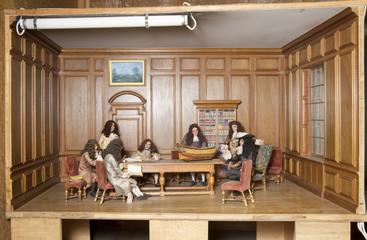
Samuel Pepys 1633 - 1703
- occupation:
- Diarist, Naval official
- Nationality:
- English; British
- born in:
- Fleet Street, City of London, London, Greater London, England, United Kingdom
1649 – was an approving spectator at the execution of King Charles I. 1650 – was given a leaving exhibition by St Paul’s. Entered Trinity Hall, Cambridge, originally to study law. 1651 – took up residence as a sizar at Magdalene college. 1653 – reprimanded for drunkenness in hall. 1654 – took his BA. 1658 – underwent a potentially lethal operation to remove a kidney stone. Acquired a part-time place as teller in the exchequer under George Downing. 1659 – took dispatches to Mountagu, general-at-sea, in the Baltic. 1660 – started his diary. Proceeded MA. Took up the post of clerk of the Acts of the Navy Board. 1662 – admitted a younger brother of Trinity House. Received the freedom of Portsmouth. 1664 - appointed to the commission of the royal fishery by its charter. 1665 – was described by the duke of Albemarle as ‘the right hand of the Navy.’ Appointed surveyor-general of victualling. 1666 – brought the news of the Great Fire personally to King Charles II. 1667 – following the government’s decision to abandon an unprofitable war, he helped discharge the fleet. 1668 – his wife discovered him indecently engaged with her maid. 1669 – fear of blindness led him to end the writing of his diary. 1672 – admitted elder brother of Trinity House. 1676 – was made governor of Christ’s Hospital. Elected Master of Trinity House. 1677 – the Clothworkers Company chose him as its master. 1679 – along with shipwright, Sir Anthony Deane, was charged with leaking naval secrets to the French and sent to the Tower. 1680 – due to an inability to construct a case against them, the pair were released from the Tower without charge. 1682 – was sent to Tangier in Lord Dartmouth’s fleet to help with the evacuation of an unsustainable colony. 1684 - returned to office by letters patent which named him secretary for the affairs of the Admiralty of England, a post created for him and of which he was the only holder. Elected president of the Royal Society. 1686 – proposed a three year ‘special commission’ which would combine the functions of the Admiralty and the Navy Board, which was accepted by King James II. 1689 – stood for election for the seat of Harwich but was defeated by the whig candidate. 1690 – imprisoned in the Westminster gatehouse (along with his clerk, Will Hewer and Sir Anthony Deane) on suspicion of treason against the new government. 1701 – moved to Will Hewer’s Clapham residence where he eventually died.
